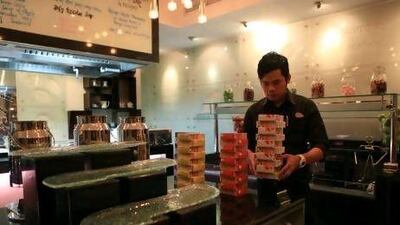ABU DHABI // At 3am on any given day Aldrin Aguilar is almost certainly awake, buzzing along on coffee and music videos.
He might be folding napkins, or gazing expectantly towards the door of the 24-hour restaurant in which he works.
But he is probably not serving a customer. The graveyard-shift waiter rarely sees diners during his time at Resto at the One to One Hotel.
"Sometimes zero," says Mr Aguilar, 23, from the Philippines.
The night can be quiet but he does not mind.
"It's nice to work in the night shift," Mr Aguilar says. "Better than in the morning."
About 100 diners pass daily through Resto, which serves mezze, salads, pasta and Indian food. It stays open for a handful of late-night diners and hotel guests who arrive at odd hours.
"We have very few places in town open 24 hours," says the restaurant's manager, Salim Mohammad.
Mr Aguilar is often the only server who works overnight, from 11pm to 8am.
When diners do arrive late, waiters can spend more time with them, says Yubaraj Ghale, who has worked overnight while Mr Aguilar was on vacation.
"The talking is nice because nobody is here," says Mr Ghale, 26, from Nepal.
Tonight there are no diners at all for Mr Aguilar. About the time revellers are pouring out of clubs, teenagers are hunting for shawarma and children are dreaming, Mr Aguilar is sorting the place cards for tomorrow's buffet. He measures his days in dishes: green chilli pickle, guava juice, home-made muesli.
"Most days it's the same, only changing the main dish," he says. "Egg noodles today, tomorrow chicken. The potato was roasted potatoes. Now hash browns."
Raised in a province called Quezon, Mr Aguilar loved computer games as a teenager, especially Counter-Strike. He studied computer programming but left school for financial reasons.
"If I will spend my money going to school, I will spend my family's purse," he says.
He met his wife Rhupa while helping out in a school canteen his father managed. Then he followed his older brother to the UAE, searching for work that paid more.
"In my country, there are no jobs with good salaries," Mr Aguilar says.
His wife was pregnant when he left the Philippines. His daughter, Angela, is now two years old. He visited home for two months recently.
"Normal life," he says.
Coming back was difficult.
"To be far away from your family, it is not easy."
Mr Aguilar's brother lives in Dubai, working for another hotel.
"He is very lucky, because his wife is here also, same hotel," Mr Aguilar says. "Me, I am planning to bring my wife, also."
When Mr Aguilar leaves work each morning, he walks 10 minutes to the apartment where he lives alone. He chats on his computer and watches videos, then tries to sleep in the afternoon. He wakes up about 9.30pm, some days getting only three hours of proper rest.
When he arrives at the restaurant, he catches the tail-end of dinner.
"Sometimes there is one table, sometimes two," he says. "I do setup. Then I need to check the cash. Clean the bar."
He has paperwork, receipts to check from the previous day.
By 1.30am, the 23 tables are empty. The air conditioning hums. A phone rings far away.
"Right now, I want to drink coffee," Mr Aguilar says. "I am always drinking coffee at nighttime. Because otherwise I will feel sleepy if there is nothing to do."
The television behind the bar plays a stream of pop songs, pushing him onwards.
"If I don't turn the music on, it will be boring," Mr Aguilar says. "That is why I put on the music videos. Every night, music videos."
He keeps himself busy. He lays out glasses by the juice bar. He switches the bread plates for breakfast plates.
Some time after 3am, the cook ambles in, singing to himself, and switches on the burners in the buffet. This is Mr Aguilar's cue to start arranging the name cards for each dish, shuffling to find the day's specials.
Breakfast will begin at 6am, when diners trickle in: hotel guests, or people from the neighbourhood stopping by before work. Their day will be starting. Mr Aguilar's will be ending.
But for the next few hours, he is all alone.

